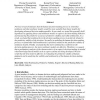Free Online Productivity Tools
i2Speak
i2Symbol
i2OCR
iTex2Img
iWeb2Print
iWeb2Shot
i2Type
iPdf2Split
iPdf2Merge
i2Bopomofo
i2Arabic
i2Style
i2Image
i2PDF
iLatex2Rtf
Sci2ools
DSS
2008
2008
Human decision-making behavior and modeling effects
Previous research indicates that the human decision-making process is somewhat nonlinear and that nonlinear models would be more suitable than linear models for developing advanced decision-making models. In our study, we tested this generally held hypothesis by applying linear and nonlinear models to expert's decision-making behavior and measuring the predictive accuracy (predictive validity) and valid nonlinearity. As a result, we found that nonlinearity in the decision-making process is positively related to the predictive validity of the decision. Secondly, in modeling the human decision-making process, we found that valid nonlinearity is positively related to the predictive validity of nonlinear models. Thirdly, we found that the more nonlinearity is inherent in the decision-making process, the more nonlinear models are effective. Therefore, we suggest that a preliminary analysis of the characteristics of an expert's decision-making is needed when knowledge-based models...
Related Content
| Added | 10 Dec 2010 |
| Updated | 10 Dec 2010 |
| Type | Journal |
| Year | 2008 |
| Where | DSS |
| Authors | Choong Nyoung Kim, Kyung Hoon Yang, Jaekyung Kim |
Comments (0)

